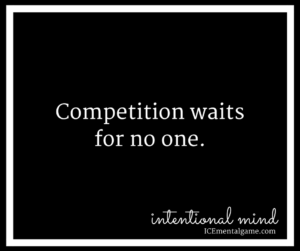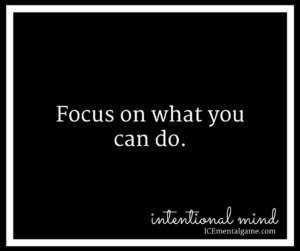
Listen to the audio version here.
Competition waits for no one.
Wouldn’t it be great if we could schedule competitions to happen when everything is perfect and you felt ready to skate?
Neither snow nor rain nor heat nor gloom of night stays these couriers from the swift completion of their appointed rounds.
Unofficial creed of the American mailman.
The reality is that competitions happen, and like the mailman, you must meet and complete the challenge no matter how prepared (or unprepared) you feel.
No matter what makes you feel unprepared, a strong mental game is the key to doing your best with the skills you have right now.
Here are some reasons skaters feel unprepared to compete:
- Not landing their jumps.
- Had last minute changes in their programs, and don’t feel solid in their performance.
- Coming off of an injury.
- Not as fit as they would like to be
No matter how solid or iffy your elements are, if you are ill or feel less than 100%, you can still be ready to compete.
The secret is a strong mental game. Your elements won’t get better overnight, but your mindset, will either allow you to sell those elements, or let them drag your whole program down.
When you focus your attention on the few things that you can’t do, those things get larger and larger until they take up all of your time and energy. All of a sudden you feel like you can’t do anything. You tell yourself “I am so bad, I am horrible.”
For example, when you focus on the jump you are having trouble with, “I can’t do this jump,” that jump becomes so big in your world, you forget all of the things you can do (your assets). Your great spins, other jumps, choreography, edges, artistry and expression seem to count for nothing.
Focus on what you can do.
Believe it or not, there are lots of things you can do well.
When you think of the things you do well, your attention to them make them become larger and larger in your world, and soon the things you can do are the center of your attention. You can see all of your great skills, and will feel confident.
Most athletes understand why this strategy works, but find it very difficult to do.
“Focusing on what I have is so hard. I try to focus on what I have, but what I don’t have keeps coming up in my mind.”
I have designed this exercise to help you take control of your thoughts so that you can change your perspective.
Download the worksheet or grab a piece of paper and something to write with.
Draw a line at the top and then a line down the middle of the paper dividing it into 2 columns.
At the top label one column: Things I can do
The other column: Things I can’t do/ what I want to do
Things I Can Do
- Think of things that you do well. Write them down.
- Start with general statements. For example: I can spin well. The jumps I have are pretty good. I am consistent. I have good artistry. I have good expression. I skate fast.
- If you can’t think of anything yourself, think about what your coaches or other people say about your skating.
- One you have a list of general statements, pick one and get more specific.
- Example: Good spins becomes–I have the potential for level 4 spins. My spins are centered. My spins are fast. I have great positions. I can hit all 4 of my bulletpoints.
- Repeat the process for the rest of your general statements.
Before you know it, you will have a list of things that you can do well.
Review them when you need a reality check or to get you back on track when you feel frustrated.
Things I can’t do/What I want to do better
- Think of things you “can’t do” or want to do better.
- Start with a general statement. For example: I can’t land this jump
- Get Specific. For example: Do you fall all the time? Only in competition? Do you get the full rotation? What is the jump quality? Do you land it in isolation, but not in program?
- What helps you to land the jump? Are there times that you jump better than other times? Is there something that you do to increase the chances of success?

Doing this exercise helps us to take a step backwards and gain some perspective on the issues. Most of the time after doing this exercise skaters realize that their problems are not as hopeless or as bad as they thought they were.
Skaters will start a session by saying, “everything is horrible! My practices are terrible. I am so not ready for competition.”
When we talk through this process we can usually narrow down one or two things that are not working, while the rest are great. Keep in mind that I am not the one saying that they are good at this skill or that skill. The skater is able to identify many things they are good at. By doing this exercise, a skater can gain some distance from their “problems” and see what is real.
This exercise is very illuminating.
It helps a skater gain perspective.It gives an athlete a reality check.
The “Things I can do” list give you reasons to feel confident.
The “Things I want to do better” list gives you the beginning of a plan to improve.
Do you want to be ready to skate your best in competition? Then work on your mental game. All of your skating skills will improve when your mind is prepared.
Get Your "Can Do" On!

Are you ready to take control of your thoughts and change your perspective? Click the Get Worksheet button to download your Can Do List and get started.
_______
Did you like this exercise? Confidence must be learned and practiced, you can’t afford to wait until you are a skating expert. A great way to begin is to download the “Confidence Myth Busters” eBook. In it you will learn how you can boost your confidence right now!
